In alignment with the United Nations Sustainable Development Goal 5 (Gender Equality) and Bahçeşehir University’s (BAU) institutional commitment to inclusive and equitable education, the University implements a series of access schemes specifically designed to support women’s participation in higher education.
BAU recognizes that gender equality in education requires both equal access to opportunity and systematic support throughout academic life. Therefore, its women-focused access programs aim to reduce structural, financial, and social barriers that may limit women’s entry, retention, and success in higher education.
Key initiatives include:
Scholarship Programs for Female Students
1- ApplyBAU Scholarship
Implemented through the ApplyBAU system, Turkey’s first and most innovative university admissions and scholarship platform introduced by Bahçeşehir University in 2013, these programs are designed to promote women’s equitable access to higher education by providing financial, academic, and social support mechanisms.
Unlike conventional exam-based admissions, the ApplyBAU model evaluates candidates holistically—considering their skills, interests, talents, motivation, and potential—thereby opening pathways for women whose capabilities may not be fully reflected in standardized testing systems.
Within the ApplyBAU framework, Bahçeşehir University allocates specific scholarship quotas for women across departments every academic year. This ensures that women have dedicated opportunities to access quality education, particularly in academic fields where female representation has historically been limited.
All applications and awards are systematically tracked and analyzed by the University’s central admissions office to monitor women’s application, acceptance, and scholarship success rates. This evidence-based approach enables BAU to adjust scholarship criteria and outreach strategies to further increase women’s participation and success in higher education.
By combining financial assistance, the ApplyBAU scholarship system not only enhances women’s access to university education but also strengthens their academic retention, graduation, and career development outcomes, contributing directly to gender equality (SDG 5) and reduced inequalities (SDG 10) in Turkey and beyond.
Through the ApplyBAU digital platform, Bahçeşehir University systematically monitors gender representation across faculties to ensure that both application and scholarship processes support gender equality. Between 2021 and 2024, the University has consistently tracked female applicants’ scholarship application and award success rates, using this data to inform evidence-based revisions to admission and financial aid policies.
The data reveal that female students continue to constitute the majority of scholarship recipients in several faculties. In the Faculty of Educational Sciences, women account for approximately 80% of all scholarships awarded by 2024, indicating strong and consistent female participation. Similarly, the Faculties of Health Sciences and Architecture and Design have maintained high female representation—ranging between 70% and 85%—demonstrating sustained gender balance in traditionally female-oriented disciplines.
In contrast, faculties such as Engineering and Natural Sciences and Law have exhibited more dynamic trends. The proportion of scholarships awarded to female students in these areas has progressively increased over the four-year period, with notable improvements particularly in Law, where the percentage rose from around 40% in 2021 to 60% in 2024. The Faculties of Applied Sciences, Economics, Administrative and Social Sciences, and Communication show stable gender parity, with scholarships distributed almost equally between male and female students.
These outcomes confirm that BAU’s institutional policies and the ApplyBAU platform have jointly contributed to strengthening female participation and equitable scholarship access. The data are visually represented in graphs below, which illustrate gender distribution trends in scholarship awards by faculty between 2021 and 2024.
The graphs below present the monitoring reports of the relevant statistics by year and faculty.
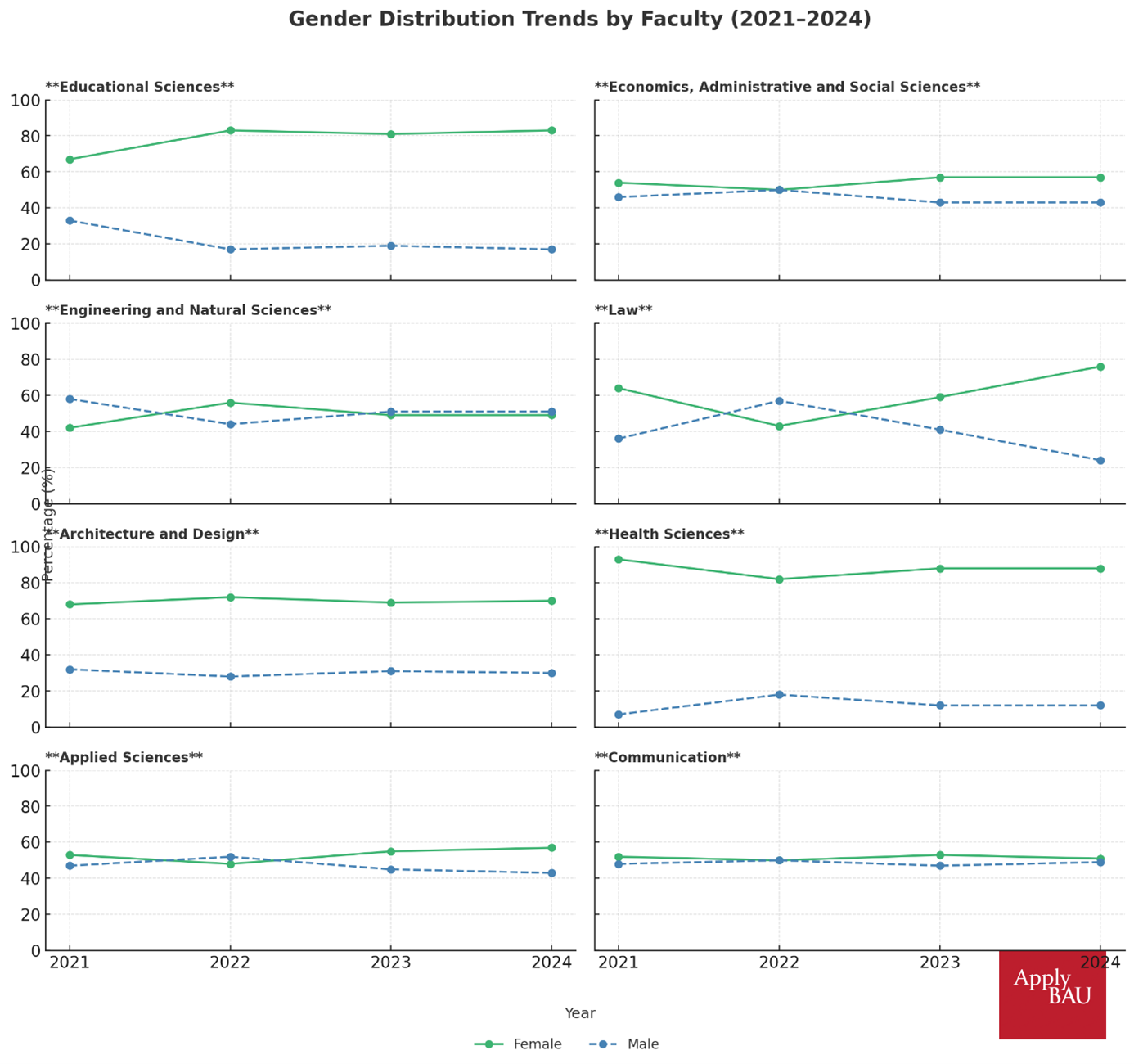
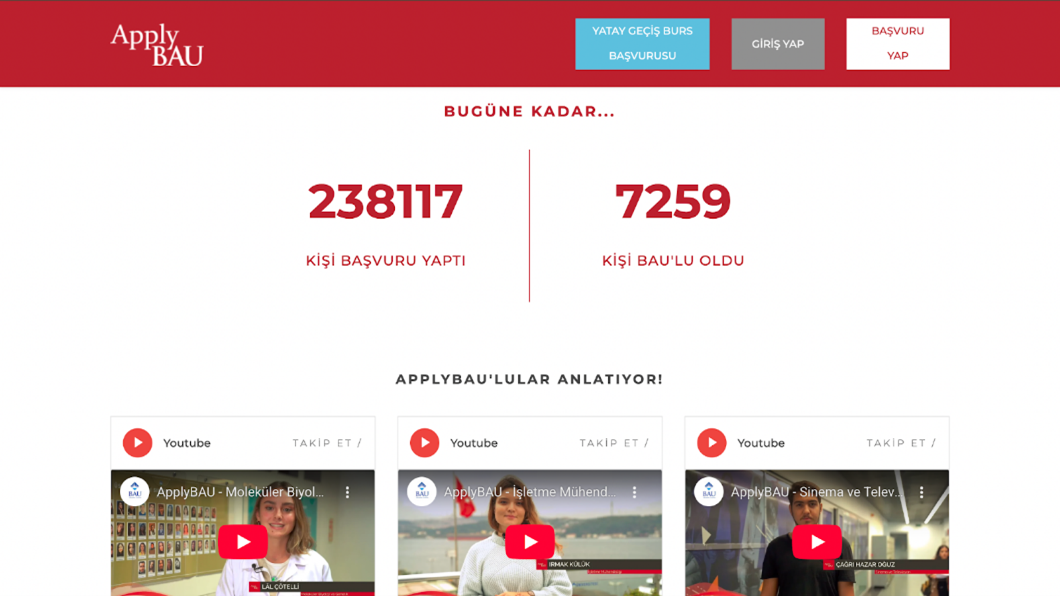
2- Full PhD Scholarships
In 2023-2024 academic year, Bahçeşehir University (BAU) launched the Science Scholarship Phd Program as part of its institutional commitment to supporting scientists and advancing gender equality in education and research. The program aims to encourage excellence in doctoral studies while ensuring that women are equally represented and supported in academic fields where they remain underrepresented — particularly in science, technology, and engineering.
Within the scope of this initiative, 77 doctoral students received science scholarships during the relevant academic year, 40 of whom were women (51.9%). This reflects BAU’s dedication to promoting women’s participation and leadership in scientific research and innovation.
Science scholarships are granted for the entire duration of doctoral education, which in Türkiye is a minimum of four years, and continue uninterrupted until the completion of the doctoral program as defined by the national higher education framework.
By prioritizing women’s access to opportunities in STEM and supporting their academic advancement through long-term financial and institutional assistance, Bahçeşehir University reinforces its commitment to gender equality, inclusivity, and the empowerment of women in science.
The table below presents the distribution of doctoral students receiving science scholarships, demonstrating BAU’s proactive approach in supporting female scholars and ensuring balanced participation in research fields traditionally dominated by men.
|
1 |
BUĞRA |
TAŞDEMİR |
BİLGİSAYAR MÜHENDİSLİĞİ (İNGİLİZCE, DOKTORA) |
|
2 |
MERVE |
KARA |
EĞİTİM TEKNOLOJİSİ (İNGİLİZCE, DOKTORA) |
|
3 |
LARA |
ÖZER |
EĞİTİM TEKNOLOJİSİ (TÜRKÇE, DOKTORA) |
|
4 |
VESİLE DERYA |
ÇAKIR |
EĞİTİM TEKNOLOJİSİ (TÜRKÇE, DOKTORA) |
|
5 |
ARİFE CEREN |
GÜRSOY |
EĞİTİM TEKNOLOJİSİ (TÜRKÇE, DOKTORA) |
|
6 |
Margrit |
Yeşiltepe |
EĞİTİM TEKNOLOJİSİ (TÜRKÇE, DOKTORA) |
|
7 |
ÖZLEM |
BAYRAKTAR GÖKŞEN |
EKONOMİ VE FİNANS (İNGİLİZCE, DOKTORA) |
|
8 |
KENAN |
PELVAN |
EKONOMİ VE FİNANS (İNGİLİZCE, DOKTORA) |
|
9 |
SEZGİN CUMHUR |
ÖRNEK |
EKONOMİ VE FİNANS (İNGİLİZCE, DOKTORA) |
|
10 |
SERDAR |
KAYA |
ENDÜSTRİ MÜHENDİSLİĞİ (İNGİLİZCE, DOKTORA) |
|
11 |
ŞÜKRAN ECE |
ESİRGEN |
ENDÜSTRİ MÜHENDİSLİĞİ (İNGİLİZCE, DOKTORA) |
|
12 |
HANDE BESNA |
GÖÇEN |
FİZYOTERAPİ VE REHABİLİTASYON (TÜRKÇE, DOKTORA) |
|
13 |
HAVVA EZGİ |
ALBAYRAK |
FİZYOTERAPİ VE REHABİLİTASYON (TÜRKÇE, DOKTORA) |
|
14 |
ŞENOL |
SÖĞÜT |
İNGİLİZ DİLİ EĞİTİMİ (İNGİLİZCE, DOKTORA) |
|
15 |
CEMRENUR |
MANGIR |
İNGİLİZ DİLİ EĞİTİMİ (İNGİLİZCE, DOKTORA) |
|
16 |
NİHANSU |
YURTSEVEN AKIŞ |
İNGİLİZ DİLİ EĞİTİMİ (İNGİLİZCE, DOKTORA) |
|
17 |
MUSA DUHAN |
MUSAOĞLU |
İNGİLİZ DİLİ EĞİTİMİ (İNGİLİZCE, DOKTORA) |
|
18 |
ALPAY |
GÖKÇE |
İŞLETME (İNGİLİZCE, DOKTORA) |
|
19 |
BEKİR |
POLAT |
İŞLETME (İNGİLİZCE, DOKTORA) |
|
20 |
HASAN |
KARAMAN |
İŞLETME MÜHENDİSLİĞİ (TÜRKÇE, DOKTORA) |
|
21 |
RAGIP |
ŞENGÜL |
ÖZEL HUKUK (TÜRKÇE, DOKTORA) |
|
22 |
BEYHAN |
ÖZEREN |
ÖZEL HUKUK (TÜRKÇE, DOKTORA) |
|
23 |
NİHAN |
KALKAN |
REHBERLİK VE PSİKOLOJİK DANIŞMANLIK (TÜRKÇE, DOKTORA) |
|
24 |
İREM |
HATTAT |
REKLAMCILIK VE HALKLA İLİŞKİLER (TÜRKÇE, DOKTORA) |
|
25 |
RAFET FATİH |
ÖZGÜR |
REKLAMCILIK VE HALKLA İLİŞKİLER (TÜRKÇE, DOKTORA) |
|
26 |
ÖMER BATUHAN |
ÖZMEN |
REKLAMCILIK VE HALKLA İLİŞKİLER (TÜRKÇE, DOKTORA) |
|
27 |
HAMDİ |
APALI |
SİNEMA VE MEDYA ARAŞTIRMALARI (İNGİLİZCE, DOKTORA) |
|
28 |
ÖMER FARUK |
CANDAL |
SİNİRBİLİM (TÜRKÇE, DOKTORA) |
|
29 |
MUSTAFA FATİH |
ÇETİNTAŞ |
SİNİRBİLİM (TÜRKÇE, DOKTORA) |
|
30 |
AKIN |
AKYÜZ |
SİNİRBİLİM (TÜRKÇE, DOKTORA) |
|
31 |
AHMET ERTUĞRUL |
AKYOL |
SİYASET BİLİMİ VE ULUSLARARASI İLİŞKİLER (İNGİLİZCE, DOKTORA) |
|
32 |
BÜŞRANUR |
TENİK |
SİYASET BİLİMİ VE ULUSLARARASI İLİŞKİLER (İNGİLİZCE, DOKTORA) |
|
33 |
EMEL |
TOPÇU |
EĞİTİM TEKNOLOJİSİ (İNGİLİZCE, DOKTORA) |
|
34 |
SELİN |
ÖZDEMİR |
EĞİTİM TEKNOLOJİSİ (İNGİLİZCE, DOKTORA) |
|
35 |
DİLA |
SÜZAN |
EĞİTİM TEKNOLOJİSİ (İNGİLİZCE, DOKTORA) |
|
36 |
BERRİN |
KEMAHLI |
EĞİTİM TEKNOLOJİSİ (İNGİLİZCE, DOKTORA) |
|
37 |
SEHLA |
ERTAN |
EĞİTİM TEKNOLOJİSİ (TÜRKÇE, DOKTORA) |
|
38 |
ZEYNEP |
AYDEMİR |
EĞİTİM TEKNOLOJİSİ (TÜRKÇE, DOKTORA) |
|
39 |
MERVE |
SERT ORHAN |
EĞİTİM TEKNOLOJİSİ (TÜRKÇE, DOKTORA) |
|
40 |
CEM |
TAŞDEMİR |
EĞİTİM TEKNOLOJİSİ (TÜRKÇE, DOKTORA) |
|
41 |
OKTAY |
ÇETİN |
ENDÜSTRİ MÜHENDİSLİĞİ (İNGİLİZCE, DOKTORA) |
|
42 |
MEHMET |
ÖZ |
ENDÜSTRİ MÜHENDİSLİĞİ (İNGİLİZCE, DOKTORA) |
|
43 |
CANSU |
DEMİR |
FİZYOTERAPİ VE REHABİLİTASYON (TÜRKÇE, DOKTORA) |
|
44 |
GÖRKEM |
AÇAR |
FİZYOTERAPİ VE REHABİLİTASYON (TÜRKÇE, DOKTORA) |
|
45 |
YUSUF |
YAŞASIN |
FİZYOTERAPİ VE REHABİLİTASYON (TÜRKÇE, DOKTORA) |
|
46 |
BEYZA |
ÇOBAN |
FİZYOTERAPİ VE REHABİLİTASYON (TÜRKÇE, DOKTORA) |
|
47 |
BETÜL |
ÜNAL |
FİZYOTERAPİ VE REHABİLİTASYON (TÜRKÇE, DOKTORA) |
|
48 |
İLKER CAN |
BÜYÜKKIRLI |
FİZYOTERAPİ VE REHABİLİTASYON (TÜRKÇE, DOKTORA) |
|
49 |
ÖZNUR |
KAYA SAĞLAM |
FİZYOTERAPİ VE REHABİLİTASYON (TÜRKÇE, DOKTORA) |
|
50 |
ZERRİN |
YILMAZ |
FİZYOTERAPİ VE REHABİLİTASYON (TÜRKÇE, DOKTORA) |
|
51 |
KÜBRA |
CAN |
HEMŞİRELİK (TÜRKÇE, DOKTORA) |
|
52 |
BARIŞ |
ÖZDERE |
HEMŞİRELİK (TÜRKÇE, DOKTORA) |
|
53 |
MELİKE |
UBUZ |
İNGİLİZ DİLİ EĞİTİMİ (İNGİLİZCE, DOKTORA) |
|
54 |
NİHAL |
OZDEMİR |
İNGİLİZ DİLİ EĞİTİMİ (İNGİLİZCE, DOKTORA) |
|
55 |
SEÇİL |
CENGİZ |
İNGİLİZ DİLİ EĞİTİMİ (İNGİLİZCE, DOKTORA) |
|
56 |
KAAN |
ÖZKORKMAZ |
İŞLETME (İNGİLİZCE, DOKTORA) |
|
57 |
MEHMET RAŞİT |
ÖZDOĞLAR |
İŞLETME (İNGİLİZCE, DOKTORA) |
|
58 |
ÖZGÜR VOLKAN |
ŞAHİN |
İŞLETME MÜHENDİSLİĞİ (TÜRKÇE, DOKTORA) |
|
59 |
TAHA |
TAŞDEMİR |
İŞLETME MÜHENDİSLİĞİ (TÜRKÇE, DOKTORA) |
|
60 |
BURAK |
ŞAHİN |
İŞLETME MÜHENDİSLİĞİ (TÜRKÇE, DOKTORA) |
|
61 |
AFŞİN BURAK |
UMAR |
KAMU HUKUKU (TÜRKÇE, DOKTORA) |
|
62 |
Mariame |
Bentaibi |
MİMARLIK VE TASARIM (İNGİLİZCE, DOKTORA) |
|
63 |
RAGIP |
ŞENGÜL |
ÖZEL HUKUK (TÜRKÇE, DOKTORA) |
|
64 |
BUĞRA |
ÖZTÜRK |
REHBERLİK VE PSİKOLOJİK DANIŞMANLIK (TÜRKÇE, DOKTORA) |
|
65 |
NESLİGÜL DENİZ |
KOLAŞİNLİ |
REKLAMCILIK VE HALKLA İLİŞKİLER (TÜRKÇE, DOKTORA) |
|
66 |
MURAT |
GÖLLÜ |
REKLAMCILIK VE HALKLA İLİŞKİLER (TÜRKÇE, DOKTORA) |
|
67 |
SİBEL |
ELALTUNTERİN |
SİNEMA VE MEDYA ARAŞTIRMALARI (İNGİLİZCE, DOKTORA) |
|
68 |
BEGÜM |
LAVKOR |
SİNEMA VE MEDYA ARAŞTIRMALARI (İNGİLİZCE, DOKTORA) |
|
69 |
BALIM |
İSLAMOĞLU |
SİNEMA VE MEDYA ARAŞTIRMALARI (İNGİLİZCE, DOKTORA) |
|
70 |
BERKE |
DOĞANOĞLU |
SİNEMA VE MEDYA ARAŞTIRMALARI (İNGİLİZCE, DOKTORA) |
|
71 |
MUSTAFA |
TÜRKAN |
SİNEMA VE MEDYA ARAŞTIRMALARI (İNGİLİZCE, DOKTORA) |
|
72 |
BANU |
TOPÇU DİREN |
SİNEMA VE MEDYA ARAŞTIRMALARI (İNGİLİZCE, DOKTORA) |
|
73 |
EHSAN |
SAYYAH |
SİNİRBİLİM (TÜRKÇE, DOKTORA) |
|
74 |
BAHAR |
KILIÇ |
SİYASET BİLİMİ VE ULUSLARARASI İLİŞKİLER (İNGİLİZCE, DOKTORA) |
|
75 |
FATMA |
UÇURUM |
SOSYOLOJİ (İNGİLİZCE, DOKTORA) |
|
76 |
PINAR |
KARAKAYA |
SOSYOLOJİ (TÜRKÇE, DOKTORA) |
|
77 |
AKIN |
MUTLU |
SOSYOLOJİ (TÜRKÇE, DOKTORA) |
3- BAU Graduate School – Master’s Scholarships and Women’s Support Program
BAU actively promotes gender equality and women’s participation in graduate education through dedicated scholarship programs. Within the BAU Graduate School, women pursuing master’s degrees receive financial and academic support to strengthen their representation in higher education and research. These scholarships aim to empower women scholars, encourage academic excellence, and contribute to a more inclusive and equitable academic environment in line with the Sustainable Development Goals (SDG 4 – Quality Education, SDG 5 – Gender Equality, and SDG 10 – Reduced Inequalities).
The graph below illustrates the overall proportion of female and male students enrolled in graduate programs, along with their respective scholarship rates.
Across the two academic years, the overall distribution indicates that 58.6% of scholarships were awarded to female students, while 41.4% were granted to male students. This consistent gender balance reinforces BAU’s commitment to equitable funding policies and gender-sensitive approaches to postgraduate education, particularly in STEM and engineering areas.
The graph below illustrates the overall proportion of female and male scholarship recipients in graduate schools, along with their respective scholarship rates.
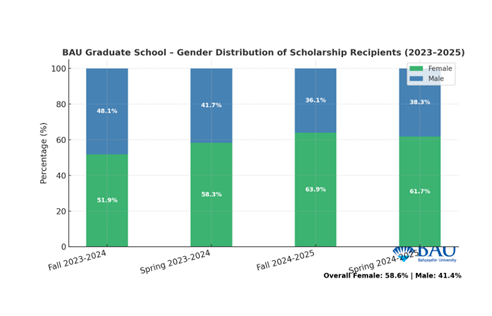
Women Students Mentorship Program
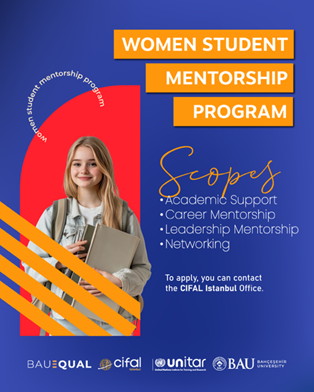
The Women Students Mentorship Program at Bahçeşehir University (BAU) is a structured, university-wide initiative designed to empower female students by providing continuous academic, professional, and personal guidance throughout their education. The program’s main objective is to help women achieve equitable participation, develop leadership skills, and overcome structural and cultural barriers that may limit their progress in higher education and future careers.
Under this program, each participating student is paired with an experienced mentor—drawn from both academia and industry—based on her field of study, career goals, and individual needs. Mentors include university faculty members, business leaders, entrepreneurs, policymakers, and alumni who volunteer to guide students through their academic journey and career planning process.
The program follows a structured mentoring model that includes:
A key focus of the program is to strengthen self-confidence, leadership capacity, and decision-making skills among women students. The mentorship process emphasizes peer solidarity and intergenerational knowledge sharing, fostering a community of women who support one another’s success.
Through the Women Students Mentorship Program, Bahçeşehir University directly contributes to SDG 5 (Gender Equality) and SDG 4 (Quality Education) by ensuring that female students are not only admitted but are also empowered to excel, lead, and inspire future generations.
Career and Long-Term Internship Program Supporting Women Students
At Bahçeşehir University (BAU), the university experience is viewed as a formative period for shaping students’ professional identities and preparing them for meaningful, future-oriented careers. Through the CO-OP Education Model, BAU provides a comprehensive career development ecosystem that combines long-term internships with career counseling, workshops, mock job interviews, seminars, and industry mentorship programs. These initiatives equip students with the confidence, decision-making ability, and real-world skills necessary to transition successfully into the workforce.
Within this framework, the BAU CO-OP Career Center manages the entire process of placing students into long-term internship programs in close coordination with the Human Resources (HR) departments of partner companies. The selection and placement process mirrors professional recruitment systems—including job postings, application collection, interviews, and candidate shortlisting—thereby serving as a realistic simulation of the post-graduation employment environment. All administrative and insurance procedures for selected students are managed by the university under the supervision of the CO-OP team.
As part of BAU’s institutional commitment to gender equality, the COOPER Program operates under the principle of ensuring equal access for women students to internship and employment opportunities. Targeted efforts are made to encourage female participation in the program, particularly in sectors and roles where women remain underrepresented. The placement rates of female students are systematically monitored and reported annually, ensuring transparency and continuous progress toward gender balance.
In recent years, data from the BAU COOPER Program have shown a higher participation rate among female students than male students, reflecting the university’s sustained efforts to promote equal opportunity and women’s career advancement.
In 2023, female students represented 56.4% of all CO-OP participants, while male students accounted for 43.6%. This upward trend in female participation continued into 2024, with women comprising 55.5% and men 44.5% of the total participants. These figures demonstrate that female students continue to actively engage in experiential learning and long-term internship opportunities, benefiting from BAU’s inclusive approach to career-oriented education.
The graph below visually presents the gender distribution in the CO-OP program between 2023 and 2024, underscoring the University’s ongoing commitment to ensuring equal access to practical training and professional experience for all students.
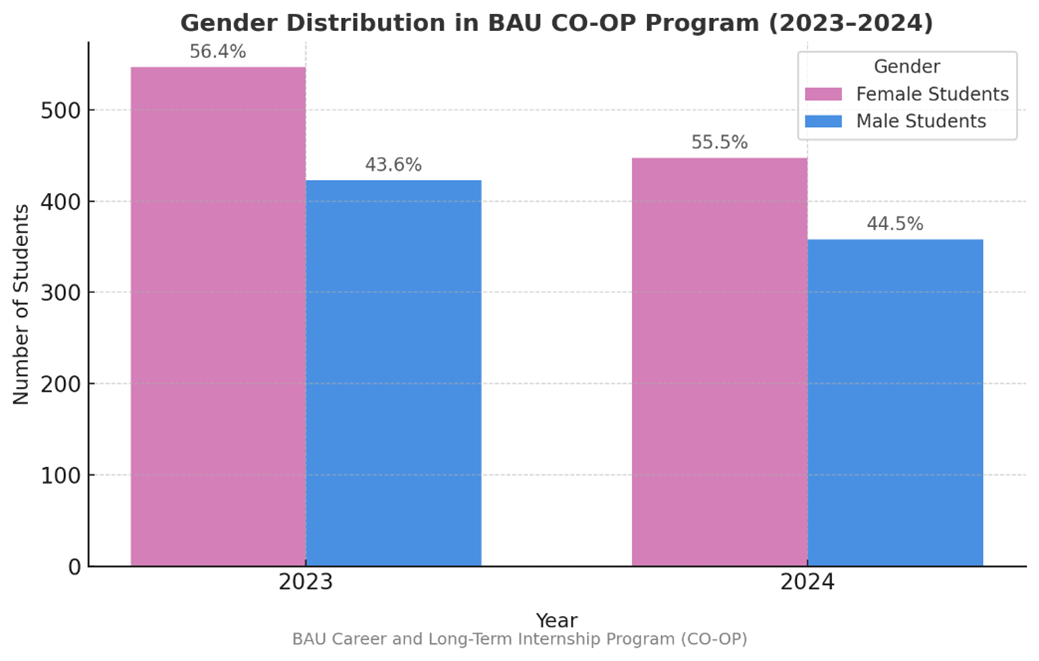
Through these inclusive practices, Bahçeşehir University continues to align its education and employment strategies with SDG 4 (Quality Education), SDG 5 (Gender Equality), and SDG 8 (Decent Work and Economic Growth) — fostering an equitable, diverse, and empowered new generation of professionals.
BAU: “Equal Opportunity Model” Certified University
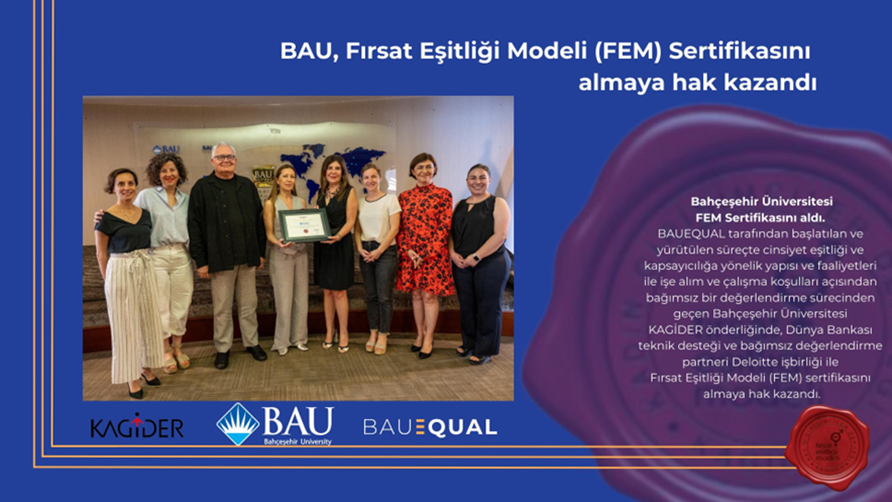
BAU has been officially recognized as an “Equal Opportunity Model (FEM)” Certified University, a distinction developed and implemented by the Women Entrepreneurs Association of Türkiye (KAGİDER) with the support of the World Bank. This certification affirms BAU’s strong institutional commitment to promoting gender equality, diversity, and women’s empowerment in education and employment.
The Equal Opportunity Model (FEM) is designed to identify and address inequalities in organizational processes such as recruitment, training, career development, and promotion, ensuring that gender does not influence access to opportunities or professional advancement. The program—developed under the leadership of KAGİDER, with technical support from the World Bank and in collaboration with PricewaterhouseCoopers (PwC) and Ernst & Young (EY)—sets internationally recognized standards for gender equality and inclusion in the workplace.
Following a rigorous independent evaluation and audit process, Bahçeşehir University achieved certification by demonstrating comprehensive gender-sensitive practices and governance mechanisms across its institutional structure. This achievement reflects BAU’s sustained efforts to create a fair, inclusive, and equitable working environment for all, reinforcing its leadership in aligning higher education with SDG 5 (Gender Equality) and SDG 8 (Decent Work and Economic Growth).
By attaining the FEM certification, Bahçeşehir University stands as a national and international example of how academic institutions can integrate equal opportunity principles into their operational and human resources systems—ensuring that gender equality is not only a value but a lived practice across all levels of the organization.